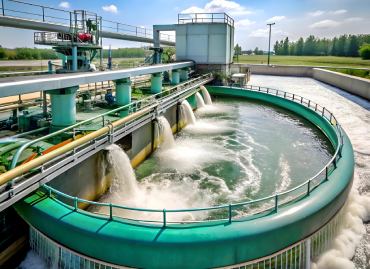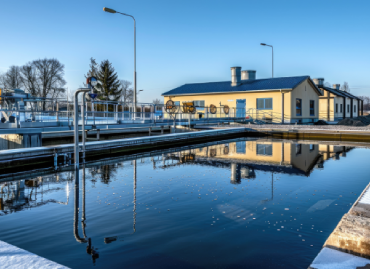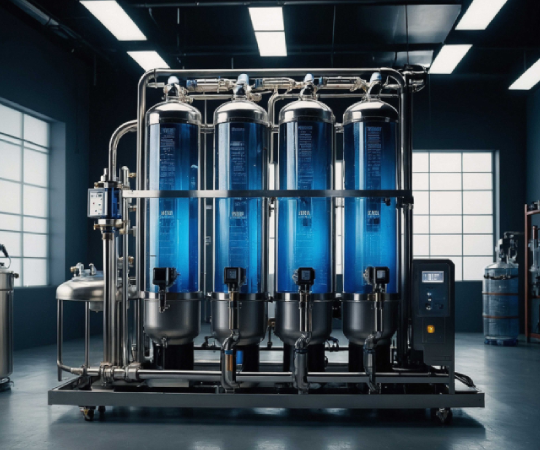- By Admin
- 02 Aug 2025
- ETP Plant
Comprehensive Water and Wastewater Treatment Solutions for Sports Complexes Using STP, ETP, RO Systems
Sports complexes, particularly in fast-developing urban areas like Maharashtra, are rapidly becoming critical hubs for training and sporting events. With increasing urbanisation and greater participation in sports, the need for efficient water management systems has surged. Whether for swimming pools, irrigation, hygiene maintenance, or arena cleaning, water usage in sports facilities is multifaceted and substantial.
In complex facilities, water is essential not only for recreational purposes such as swimming but also for operational activities like field irrigation, cleaning sports surfaces, and maintaining hygiene standards in locker rooms, restrooms, and canteens. The demand for water across these diverse areas can exceed thousands of litres per day, especially during large events or tournaments. Without a proper system in place, these vast amounts of water usage can lead to resource strain and inefficiency.
An intelligent approach to water management is crucial to ensure uninterrupted operations, maintain facility hygiene, and preserve resources. Given these challenges, sports complex managers increasingly rely on advanced water treatment systems to meet their growing demands and ensure long-term sustainability.
"Water is the backbone of sports infrastructure, enabling everything from athlete safety to facility hygiene. Efficient management of water resources and wastewater treatment systems not only ensures smooth operations but also reflects environmental responsibility. A sports complex without proper water treatment is like a field without players—unplayable and unsustainable."
Wastewater Generation in Sports Complexes
Daily operations in sports complexes lead to the generation of large amounts of wastewater. These wastewaters stem from activities such as swimming pool maintenance, locker room showers, cleaning operations, and food court facilities. For instance, the filtration and backwashing of swimming pools require regular attention and produce a significant amount of wastewater. Similarly, locker rooms, canteens, and bathrooms generate large volumes of greywater and blackwater, both of which contain oils, food residues, soaps, and detergents.
"Water is not just a utility in sports complexes—it's the silent backbone of hygiene, maintenance, and athlete safety. Efficient water usage and proper wastewater treatment are essential to keep facilities functional, eco-friendly, and future-ready. Without water, even the best sports infrastructure becomes unplayable."
Sports complexes must also contend with wastewater generated from food courts, which are rich in organic waste, oils, and grease. Events with large audiences only add to this demand, contributing to a higher volume of wastewater. As a result, sports facilities must adopt a comprehensive and sustainable water treatment solution to ensure that water is efficiently managed, reused, and treated.


Types of Wastewater Found in Sports Complexes
The composition of wastewater in sports complexes varies widely depending on its source. Greywater, generated from showers and sinks, contains soap, oils, and personal care products. Swimming pool water, on the other hand, often includes disinfectants like chlorine. Turf wash-down water may carry soil, fertilisers, and debris. Additionally, wastewater from kitchens in sports complexes tends to include oils, fats, and food residue, while toilet and urinal wastewater, known as blackwater, requires biological treatment.
These varying types of wastewater necessitate specialised treatment methods. Sewage Treatment Plants (STPs), Effluent Treatment Plants (ETPs), and Reverse Osmosis (RO) systems are all vital technologies for treating these effluents. STPs, for instance, are used to treat greywater and blackwater using processes like sedimentation, aeration, and disinfection. ETPs are often deployed in kitchens and food courts to handle greasy wastewater, employing oil separators, biological filters, and sludge handling units. RO systems can treat water for reuse in cooling systems or cleaning applications.
Steps Taken by Sports Complexes for Wastewater Treatment
To ensure proper treatment of wastewater, large sports complexes often implement customised wastewater treatment systems. STPs and ETPs are installed based on the type of effluent generated. The treated water can either be reused for non-potable applications such as irrigation, toilet flushing, or landscape watering, or it can be safely discharged into municipal sewers after treatment.
By adopting these systems, sports facilities not only comply with environmental regulations but also significantly contribute to water conservation efforts. The use of treated water for non-potable purposes reduces the overall demand for freshwater, which can be a valuable resource for other local needs.
Smart Technologies in Wastewater Treatment
Sports complexes are increasingly integrating smart technologies into their water management systems. Real-time monitoring tools track the water quality at all stages of treatment, ensuring optimal performance. Automation of processes like chemical dosing, aeration, and filtration enhances the efficiency of the treatment plants while minimising human intervention. Some advanced systems also utilise membrane bioreactor (MBR) technology for compact and highly efficient wastewater treatment, making it an ideal solution for larger complexes with limited space.
Industrial RO systems are also being utilised in some sports facilities to recycle water for use in cooling systems, floor cleaning, and landscaping. By using treated water in such applications, sports complexes can greatly reduce their dependency on external water sources, ensuring both environmental sustainability and cost savings.
Comprehensive Water Treatment Solutions for Sports Complexes
We offer end-to-end water treatment solutions tailored to the specific needs of sports complexes. From consulting and system design to installation, operation, and maintenance, we provide full-service support for STPs, ETPs, WTPs, WWTPs, and industrial RO systems. Our team conducts thorough site assessments to ensure that the most suitable water treatment technologies are selected, ensuring optimal performance and compliance with environmental regulations.
Our solutions are scalable and adaptable, making them suitable for any size of sports facility—from small indoor arenas to large stadiums with high footfall. In addition to offering automated tools for monitoring water quality, data logging, and operational alerts, we empower sports facility managers with complete control over their water systems. Our goal is to help sports complexes operate efficiently while preserving natural resources and promoting sustainable water management practices.
Summary And Conclusion
Sports complexes require efficient water and wastewater management systems to ensure operational efficiency and sustainability. With growing water demands for various activities like pool maintenance, turf irrigation, and sanitation, advanced solutions such as STPs, ETPs, and industrial RO systems are vital. By adopting smart technologies and embracing water recycling practices, these complexes can reduce their reliance on external water sources, meet environmental regulations, and ensure long-term sustainability. Our comprehensive, customisable water treatment solutions provide sports complexes with the tools they need to operate effectively while conserving water and reducing their environmental impact.































































